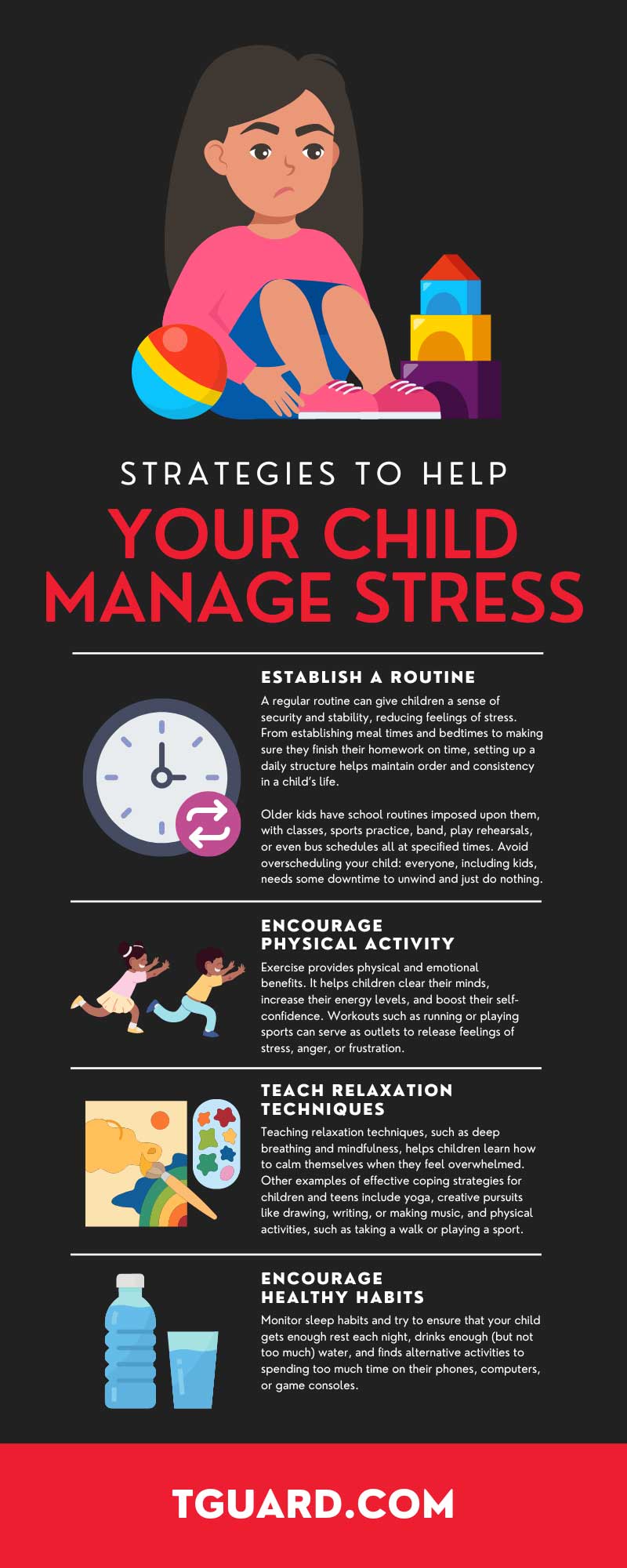Parents want the best for their children, and they strive to help them succeed in life. However, there’s no denying that life can be stressful for young ones. From school tests and bullying to social media and family problems, children can experience a wide range of stressors.
Luckily, there are methods that parents can use to help their children learn how to manage stress. Let’s take a look at the signs of childhood stress and eight strategies to help your child manage stress.
Signs of Stress in Children and Teens
The first thing parents must do to help their children cope with stress is recognize the symptoms. Signs of stress in children and teens can include:
- Frequent complaints of illness, such as headaches and stomachaches
- Irritability, mood swings, and sadness
- Intensified or renewed thumb or finger sucking
- Poor sleep or changes in sleep patterns
- Difficulty concentrating on tasks or activities
- Avoidance of people and situations that cause stress
- Changes in eating habits (overeating or refusing food)
- New phobias
- Avoiding responsibilities, such as homework, team practices, and chores
When you notice symptoms like these in your child or teen, it can be worrisome. The following eight strategies can assist parents in helping their children manage stress.
Talk to Your Child About Stress
Engaging in an open dialogue with your child about their stress is essential for understanding their concerns and helping them find ways to cope with it. Help them identify the things that are causing them stress and come up with solutions together.
Speak gently and give your child time to respond—they may be reluctant to discuss what they’re feeling and why. They’ll be more likely to share if they feel that you won’t judge them or overreact (like racing off to school to confront a bully).
If you can get to the bottom of what is bothering your child and causing them to feel stressed and anxious, then you can help them find solutions. Involving your child in working out ways to cope with or reduce stress gives them the tools and skills they need to use the next time they begin to feel overwhelmed. It can also help them feel more confident and less prone to giving in to the ordinary (and very real and sometimes substantial) pressures of growing up.
Establish a Routine
A regular routine can give children a sense of security and stability, reducing feelings of stress. From establishing meal times and bedtimes to making sure they finish their homework on time, setting up a daily structure helps maintain order and consistency in a child’s life.
Older kids have school routines imposed upon them, with classes, sports practice, band, play rehearsals, or even bus schedules all at specified times. Avoid overscheduling your child: everyone, including kids, needs some downtime to unwind and just do nothing.
Encourage Physical Activity
Exercise provides physical and emotional benefits. It helps children clear their minds, increase their energy levels, and boost their self-confidence. Workouts such as running or playing sports can serve as outlets to release feelings of stress, anger, or frustration.
Don’t restrict physical activity to team sports, either. Kids can get plenty of healthy exercise through dance, gardening, or even rearranging the furniture in their bedroom for a change of perspective.
Teach Relaxation Techniques
Teaching relaxation techniques, such as deep breathing and mindfulness, helps children learn how to calm themselves when they feel overwhelmed. Other examples of effective coping strategies for children and teens include yoga, creative pursuits like drawing, writing, or making music, and physical activities, such as taking a walk or playing a sport.
A child who had previously given up thumb or finger sucking may return to it in times of stress. Even teenagers and adults can hold onto this habit. Learn how to stop finger sucking without shaming or punishing your child since that’s ineffective and may worsen the problem. The AeroThumb and AeroFinger devices are gentle, proven ways to help children break the thumb and finger sucking habit.
Encourage Healthy Habits
Good nutrition, proper sleep, and limiting screen time can reduce stress levels in children and teens. Provide your child with healthy meals and snacks, and strive to keep highly processed foods and sugary snacks out of the house.
Monitor sleep habits and try to ensure that your child gets enough rest each night, drinks enough (but not too much) water, and finds alternative activities to spending too much time on their phones, computers, or game consoles.
Model Healthy Coping Strategies
It’s important for children to see that adults can also experience stress but use healthy coping strategies to manage it. Show your child that you are actively managing your own stress levels in positive ways, such as exercising, spending time with friends, or pursuing relaxing hobbies, like knitting or singing in a choir.
Get Outside and Have Fun
Children need time for fun leisure activities, and they need unstructured, quality time with their parents. Do something they enjoy with them, like playing a game, taking a nature walk in a nearby forest preserve, or visiting a zoo. Each can be a good way to help children manage stress in a positive manner. Getting away from screens and getting outside can allow kids to clear their minds, connect with nature, and feel more relaxed.
Seek Professional Help
If your child’s stress is causing them significant difficulties and interfering with their daily life, it may be time to seek professional help. A pediatric mental health professional can assist in providing the tools needed to manage stress levels while also helping your child build resilience.
By implementing these eight strategies to help your child manage stress, you can help your children develop the skills they need to manage stress effectively. One or several of these strategies can help your child feel more in control of their life, whether they decide to spend time out in nature or try some relaxation techniques. With these strategies, your child will be able to build a strong foundation for managing stress throughout their life.






